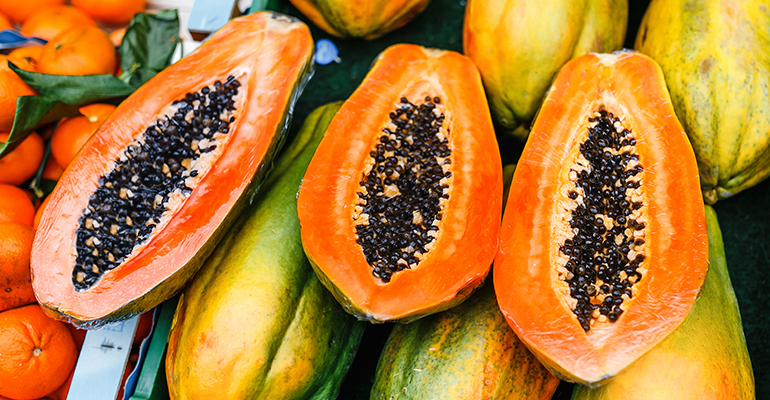News
Papaya waste upcycled for nutritious snack bars in Ethiopia
20 Apr 2021Papayas have long been praised for their enzymatic content, but they are now also finding a role as a key ingredient in snack bars made locally in Ethiopia thanks to their nutritious profile and widespread availability.
A new public-private partnership between the Global Alliance for Improved Nutrition (GAIN) and the Danish International Development Agency has teamed up with Ethiopian food producers and Arla Foods to ensure that local companies have the technology and the resources to repurpose the 30% of papaya pulp that is wasted annually as a result of spoilage.

Arla Foods has devised a prototype snack bar recipe combining papaya pulp with whey protein that is fortified with vitamins and minerals before it is dried and packaged. While the whey protein does not currently come from Arla, the company noted in a statement that it may provide that key ingredient in the future, but that it is currently focused on product innovation for the four-year project.
As part of the company’s efforts, it is working with local producers to ensure they have access to the necessary technology and expertise to produce these bars that are simultaneously combatting food waste and malnutrition in Ethiopia. The Ethiopian government is striving to reduce malnutrition-related stunting to zero by 2030.
In conjunction with developing a nutrition bar to repurpose papayas destined to become food waste, the coalition of enterprises is working with researchers at Addis Ababa University to investigate solar drying processes that are low cost and maximize nutrient retention. Developing a solar drying process offers the opportunity to preserve a larger quantity of this tropical fruit for processing as both locally-available nutrition bars as well as other applications.
With more than 890,000 farmers relying on papaya as their source of income, devising a solution to preserve and repurpose the 30% of this crop that is wasted annually will result in a boost in market availability and sales for Ethiopian farmers.
Related news

Oat Barista: Innovation for game-changing beverages
20 Nov 2025
Oat Barista is a clean label, sustainable, and innovative drink base specifically designed to create the perfect foam in one single ingredient.
Read more
Nitrites: Pressure grows on UK to follow EU’s lead
20 Nov 2025
Pressure is growing on the UK to follow the EU’s lead after the bloc revised its regulations on the permitted levels of nitrites and nitrates in cured meats.
Read more
Empowering innovation in fortification and colouration
13 Nov 2025
Divi’s Nutraceuticals offers a large portfolio of innovative, high-quality ingredients for foods, beverages, and supplements, with bespoke solutions and expert support for product success.
Read more
Danone highlights digestive health as potential ‘tipping point’ for food industry
13 Nov 2025
Danone is betting on a food industry “tipping point” that will bloat the market for healthy products, particularly those related to gut health.
Read more
Standing Ovation and Bel scale up casein production from dairy co-products
11 Nov 2025
Foodtech company Standing Ovation has partnered with cheese specialist Bel Group to manufacture dairy serums for industrial-scale casein production via precision fermentation.
Read more
AI attraction means foodtech startups must ‘prove’ rather than ‘promise’
4 Nov 2025
Reports suggest that artificial intelligence (AI) is sucking investment from foodtech and agritech, but investors say the picture is complicated.
Read more
Will postbiotics become the go-to functional ingredient?
3 Nov 2025
Postbiotics show significant promise for the functional foods market due to their safety profile and beneficial bioactive properties, research suggests.
Read more
Meet the finalists of the Fi Europe Innovation Awards 2025
31 Oct 2025
Who made it to the shortlist of the Fi Europe Innovation Awards 2025? Read about the 23 companies making food and drink products healthier and manufacturing processes more efficient.
Read more
Penguin and Club bars no longer classed as chocolate
30 Oct 2025
Penguin and Club bars can no longer be classified as chocolate after the pladis-owned McVitie’s brands turned to cheaper alternatives amid the ongoing cocoa crisis.
Read more
Shorter drying time, sweeter success!
30 Oct 2025
Curious about cost-effective, sustainable and delicious candy making? Stefan Wessel reveals how Avebe’s solutions reduce drying time and energy use by up to 50%.
Read more